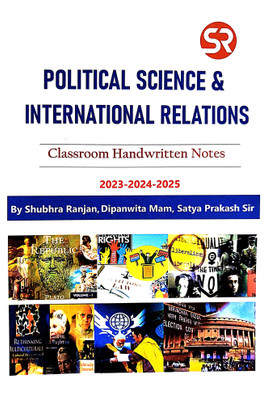PSIR POLITICAL SCIENCE AND INTERNATIONAL RELATIONS
Class Room Notes By Shubhra Ranjan Medam, Dipan Wita Mam, Satya Prakash Sir For UPSC MAINS EXAMINATION 2025-2026(Paperback, Shubhra Ranjan Medam)
Quick Overview
Product Price Comparison
Paper 1: Political Theory and Indian Politics ŌĆóPolitical Theory:This section explores core concepts like the nature and approaches to political theory, theories of the state (liberal, Marxist, etc.), justice, equality, rights, and democracy. ŌĆóIndian Political Thought:This part examines the ideas of prominent Indian thinkers like Kautilya, Raja Rammohan Roy, Gandhi, Ambedkar, and Nehru. ŌĆóWestern Political Thought:This section covers the ideas of thinkers such as Plato, Aristotle, Machiavelli, Hobbes, Locke, Mill, Marx, and Gramsci. ŌĆóIndian Government and Politics:This section delves into the Indian Constitution, its salient features, the federal system, the structure of the government, political parties, and the electoral process. Paper 2: Comparative Politics and International Relations ŌĆóComparative Politics:This section examines the theoretical frameworks for comparing political systems, political regimes, and political culture, with a focus on specific examples from different countries. ŌĆóInternational Relations:This section covers theories of international relations, major global actors, international organizations, and contemporary global issues. ŌĆóIndia and the World:This section focuses on India's foreign policy, its relationship with major powers, and its role in regional and international affairs. In essence, Paper 1 provides a foundation in political philosophy and the Indian political landscape, while Paper 2 explores the broader field of comparative politics and international relations, with a special emphasis on India's role in the global arena.

